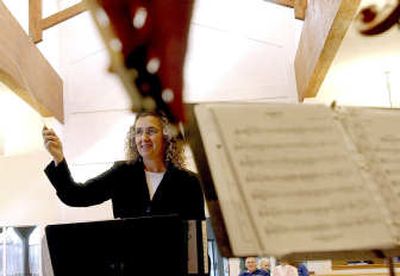‘You either fall in love with it or you don’t’

Annie Nesse’s husband recalls how his wife got involved with orchestra and string instruments.
“One day I came home and my wife has a cello. I had no clue,” said Rolf Nesse. “This was not like a lifelong thing. She found a teacher and started taking lessons.”
“I was a bit of a singer,” Annie Nesse explained. “And the cello sings. I’d always wanted to read (musical) notes. The guitar is not sufficient. I wanted control over the music.”
So Nesse, who had played guitar in the 1960s and who had a teaching certificate, learned to play the cello and then got a music certificate. She started teaching music and five years ago started The Falls Violin and Cello School, teaching fifth- to 11th-grade students in Post Falls. She teaches beginning, intermediate and advanced strings: violin, viola, cello and bass. Nesse also offers adult classes.
Her students perform at retirement homes, churches and other venues. “We played at a used car lot once. We played at a roller-skating rink,” she said. “I try to make it so they’re not just performing for parents.”
She teaches in a group setting because it’s more affordable for the students that way. Besides, she likes the blend of the sound of the instruments together. “My favorite thing with kids is learning together,” she said. “It’s like band, but it’s something about the blend of strings that attracts people.”
Being in a string quartet requires the musicians to pay attention to what the others are playing. “It’s a supreme form of listening to one another,” she said. “There is no perfect A (note). It’s the A the two of you decide on,” she explained.
“In music you really have to listen to everyone else,” said Jenny McVeigh, 15, a violinist in the high school class. “You play off every else. You get tone and pitch from everyone else.”
Nesse’s high school class meets at Community Presbyterian Church in Post Falls. Her beginning/elementary and intermediate/middle school classes meet at schools in Post Falls. Home schoolers also are included.
Nesse “came to school, offering lessons,” said Emily Calton, 14, a violin player in the high school group who’s been with Nesse since the fourth grade. “I was interested in music. My sister took guitar. It was the first slip I ever took home to my parents.”
“You either fall in love with it or you don’t,” Nesse said. “Some people fall in love with strings. I have kids in class who say ‘I never want to stop playing.’ ”
Besides the group instruction, students at the intermediate and advanced levels receive one private lesson a month. Students are given the chance to play solos during performances.
“I like the orchestra. I really like doing solos. I enjoy the feedback of the audience,” Emily said.
“For my last solo, I really got into it. I felt I could do more than what was in the piece,” said Brennan Sumpter, 16, who plays the viola. “On a good day you can play really well.”
The students also enjoy the type of music they play. “I really like rock and rap,” said Rachel Calton, 15, who plays the cello. “What we play (in the orchestra) is folk and classical. It is really a whole different aspect to music… I enjoy classical music a lot because all the parts that go into it.”
“Music is something personal. Sometimes lyrics put too much emphasis on a certain part of a song. With classical music you can put your own emphasis on it,” Jenny said.
Finding music is the challenging part of the job, Nesse said. The high school students just now can play adult music, but finding less complex music for the less advanced students is difficult – and expensive. “It would have been nice to get a grant,” she said.
Besides buying music, Nesse has acquired a lot of instruments for students to use. “I have a whole slew of rentals so everyone who wants can try.” Her rental rates are very reasonable. For example, to rent a violin from her costs $25 for the entire school year.
Learning to play a stringed instrument is less difficult than playing the piano, Nesse said, but is still challenging. “You have to want to get the pitch right. You can’t settle for flat or sharp.
“It’s definitely not for the faint of heart.”